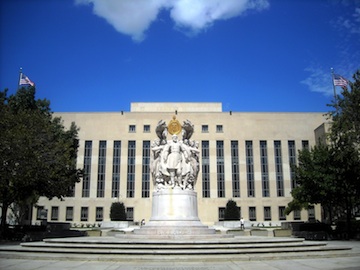FCC Defends ISP Dereg in Court Remand Response
Tells court it has relevant issues covered

The smarter way to stay on top of the multichannel video marketplace. Sign up below.
You are now subscribed
Your newsletter sign-up was successful
The FCC has a message for a federal appeals court's concerns about its net neutrality rule dereg: Not to worry.
The FCC has released the draft of its order responding to a federal court remand seeking a clearer picture of the impact of the FCC's internet access deregulation on "(1) public safety; (2) the regulation of pole attachments; and (3) universal service support for low-income consumers through the Lifeline program."
Related: GOF FCC KO's Title II
The court had upheld that deregulatory order while remanding back on those discrete issues and saying “the Commission may well be able to address on remand the issues it failed to adequately consider." The FCC says it has done just that. FCC chairman Ajit Pai has said he is confident the response will satisfy the court.
That court is the U.S. Court of Appeals for the D.C. Circuit.
Related: FCC to Address Net Neutrality Dereg Remand
The court had said the FCC had not sufficiently explained what the effect would be on those issues would be of its Restoring Internet Freedom's (RIF) elimination of the rules against blocking, throttling and paid prioritization, as well as the general conduct standard catch-all reg the previous FCC said was to address conduct that did not fit in any of the other three but might adversely affect internet access.
The smarter way to stay on top of the multichannel video marketplace. Sign up below.
The FCC's response was essentially that 1) it followed naturally from the RIF order that public safety would be promoted (it added the caveat that "even if there were some adverse impacts on public safety applications in particular cases—which we do not anticipate—the overwhelming benefits of Title I classification would still outweigh any potential harms"); 2) that the benefits of light-touch regulation under an information service definition of broadband access--rather than the telecommunications service definition of the previous FCC--outweighs any potential negative effects of losing the pole attachments rights under that telecom service definition; and 3) that it has legal authority to continue to provide Lifeline subsidies under the reclassification.
In all three cases, the FCC argues in the remand order that there is no basis to alter its conclusions in the RIF order. Those were that it needed to reverse the previous, Democratic-led, FCC's "misguided and short-lived utility-style regulation of the Internet and return to the light-touch regulatory framework for broadband Internet access service that facilitated rapid and unprecedented growth for almost two decades.
Contributing editor John Eggerton has been an editor and/or writer on media regulation, legislation and policy for over four decades, including covering the FCC, FTC, Congress, the major media trade associations, and the federal courts. In addition to Multichannel News and Broadcasting + Cable, his work has appeared in Radio World, TV Technology, TV Fax, This Week in Consumer Electronics, Variety and the Encyclopedia Britannica.

